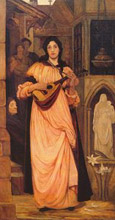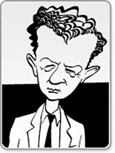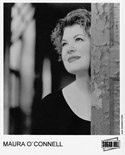The Water Is Wide
 |
This lovely ballad has been around in a variety of forms since before the Declaration of Independence was signed in 1776. In fact, that is the earliest year cited for the song which many (but not all) scholars see as its source, Jamie Douglas, (Child Ballad 204). That song laments the end of Lady Barbara Erskine's happy marriage to Lord James Douglas on account of the ruinous accusations of Blackwood in 1681.
At some point, The Water is Wide established itself as a distinct tune under the title O Waly, Waly, a Scottish lament akin to "woe is me". Here is part of one verse in the Scots language. Compare it to our second verse.
O waly waly, but love be bonny
A little time while it is new;
But when ’tis auld, it waxeth cauld
Fades awa’ like morning dew.
As with any oral (or aural) tradition, we will never know how the song was originally done. We do have contemporary arrangements, however, that hearken back to the Renaissance and Baroque eras and these perhaps give us a taste of it. Here's one from countertenor Alfred Deller and lutenist Desmond Dupré. A countertenor, by the way, is an adult male who sings in an alto or even soprano range. Alfred Deller, who died in 1979, is credited with something of a countertenor renaissance (no pun intended) as part of the "early music" revival of the last century.
 |
Audio Clip: Alfred Deller and Desmond Dupré perform O Waly, Waly
The song has been a popular choice for arrangements by classical composers even outside the niche of early music. Benjamin Britten (shown left) gave a number of folk songs the "art song" treatment and O Waly, Waly was among them. His arrangement for voice and piano was published in 1948 and has been recorded many times. Here's a clip of one such performance by the English soprano, Dame Felicity Lott.
Audio Clip: Benjamin Britten's O Waly, Waly for voice and piano.
 |
But at the end of the day, it's the folkies who have had kept this tune on stages, turntables and CD players for over 200 years now. There are fine recordings of The Water is Wide by male folk singers as diverse as early revivalist Guy Carawan on up to John Gorka and James Taylor (shown right), who included the song on his 1991 release, New Moon Shine. Gorka's cover of the tune is included on a tribute CD to "The Songs of Pete Seeger", so let's have a sampling of Pete's take on it. He's playing a 12 string guitar in Drop D tuning and taking liberties with the phrasing and tempo of the song. Being Pete Seeger, he can do as he pleases.
Audio Clip: Pete Seeger on The Water is Wide
 |
The story (of Jamie Douglas at least ) was originally told from the perspective of a woman and the song has been performed by many of the best female voices of the folk revival: Joan Baez, Judy Collins, Carolyn Hester, Priscilla Herdman and June Tabor have all recorded it, not to mention pop and rock singers like Sheryl Crow, The Indigo Girls and Cowboy Junkies. The melody is strong enough for unaccompanied vocals and Irish-born singer Maura O'Connell offers an exquisite a cappella treatment of the tune as part of the Best of the Thistle and Shamrock collection. Here's a wee bit of it:
Audio Clip: Maura O'Connell sings The Water is Wide.
Finally, here's an altogether different take on the song from violinist Darol Anger's, Heritage. Anger first stepped onto the national stage with the first David Grisman Quintet in the mid-70's and was also a co-founder of the Turtle Island String Quartet. On Heritage Anger pulls together some of the best acoustic musicians on the planet—Russ Barenberg and David Grier on guitar, Jerry Douglas on dobro, Tony Trichka on banjo, Michael Doucet, Sam Bush, John Hartford...have mercy! They stretch out for some 8 minutes on this song, including a long instrumental break. Here's an appetizer from the feast:
Audio Clip: Darol Anger and Friends on The Water Is Wide.
Recommended Recordings
All Community Guitar Resources text & material © 2006 Andrew Lawrence
